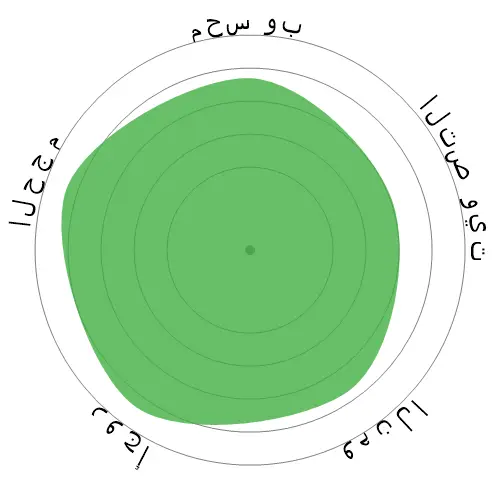محامون




الأشخاص قاموا أيضاً بالمشاهدة
مخاطر الأتمتة المحسوبة
مخاطر منخفضة (21-40%): الوظائف في هذا المستوى تحمل خطراً محدوداً للأتمتة، حيث تتطلب مزيجاً من المهارات التقنية والمهارات المركزة على الإنسان.
مزيد من المعلومات حول ما هذه النتيجة، وكيف يتم حسابها متوفرة هنا.
استطلاع رأي المستخدمين
صوت زوارنا بأنهم غير متأكدين إذا كان سيتم أتمتة هذه المهنة. ومع ذلك، قد يتمكن الموظفون من العثور على الطمأنينة في مستوى المخاطر الآلي الذي أنشأناه، والذي يظهر 23٪ فرصة للأتمتة.
ما هو رأيك في مخاطر الأتمتة؟
ما هي احتمالية أن يتم استبدال محامون بالروبوتات أو الذكاء الاصطناعي في غضون العشرين سنة المقبلة؟
المشاعر
يتم تضمين الرسم البياني التالي في أي مكان يوجد فيه عدد كبير من الأصوات لتقديم بيانات ذات مغزى. تعرض هذه التمثيلات المرئية نتائج استطلاعات المستخدمين على مر الزمن، مما يوفر دلالة مهمة على اتجاهات المشاعر.
المشاعر على مر الزمن (ربع سنوي)
المشاعر على مر الزمن (سنوياً)
النمو
من المتوقع أن يزداد 5٫2٪ عدد فرص العمل المتاحة لـ 'Lawyers' بحلول 2033
التوظيف الكلي، وفتحات الوظائف المقدرة
من المتوقع تحديث التوقعات في 09-2025.
أجور
في 2023، بلغ الأجر السنوي الوسيط لـ 'Lawyers' 145٬760 $، أو 70 $ في الساعة
تم دفع "Lawyers" بمقدار 203٫3٪ أعلى من الأجر الوسيط الوطني، الذي بلغ 48٬060 $
الأجور على مر الزمن
الحجم
بحلول 2023 كان هناك 731٬340 شخص يعملون كـ 'Lawyers' داخل الولايات المتحدة.
هذا يمثل حوالي 0٫48٪ من القوى العاملة الموظفة في جميع أنحاء البلاد
بتعبير آخر، حوالي 1 من كل 207 أشخاص يعملون كـ 'Lawyers'.
وصف الوظيفة
يمثل العملاء في الدعاوى الجنائية والمدنية والإجراءات القانونية الأخرى، يعد الوثائق القانونية، أو يدير أو ينصح العملاء في المعاملات القانونية. قد يتخصص في مجال واحد أو قد يمارس بشكل واسع في العديد من مجالات القانون.
SOC Code: 23-1011.00


تعليقات
Leave a comment
Therefore, the rise of AI also brings transformation to the legal profession. Are you specialized in a certain field? No problem—you’ll continue to earn a living. But if you’re handling general cases, that’s where trouble starts. You might not lose your job, but you might lose your income, which, in a way, amounts to the same thing.
I would, however, say that general cases may still need some lawyers as the depth of the issue becomes more complicated and just in case they want human insight (the same way that some people would still go onto Reddit to ask questions when ChatGPT can offer a faster response, and the same reason why people still phone accountants/lawyers for advice right now when AI like Perplexity have access to every single bit of legal knowledge with added citations).
اترك ردا حول هذه المهنة